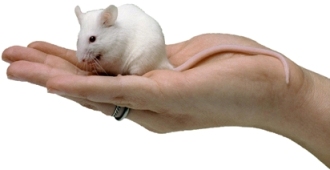
Die wegen ihres innovativen PubMed-Interface GoPubmed (PDF) bekannte Dresdener Firma Transinsight bietet nun mit der Unterstützung von BASF die Datenbank (besser ‚Interface‘) „Go3R“ an. Diese verfügt über einen intelligenten Filter für Alternativmethoden zu Tierversuchen.  Sie müssen also bei jeder Suche immer auf die oberste Kategorie „3R Relevance Filters (Beta)“ klicken, um zu diesen „alternativen“ Papern zu kommen. Diese sind zusätzlich durch ein Go3R-Siegel gekennzeichnet (siehe rechts). Darüber hinaus werden – wie aus GoPubMed bekannt – die Suchergebnisse nach Wissensgebieten kategorisiert, in denen man komfortabel weiter herumstöbern kann (die dann aber nichts mehr mit Alternativmethoden zu tun haben).
Sie müssen also bei jeder Suche immer auf die oberste Kategorie „3R Relevance Filters (Beta)“ klicken, um zu diesen „alternativen“ Papern zu kommen. Diese sind zusätzlich durch ein Go3R-Siegel gekennzeichnet (siehe rechts). Darüber hinaus werden – wie aus GoPubMed bekannt – die Suchergebnisse nach Wissensgebieten kategorisiert, in denen man komfortabel weiter herumstöbern kann (die dann aber nichts mehr mit Alternativmethoden zu tun haben).
- Bei Recherchen denken Sie auch bitte an die frei verfügbare Datenbank der Zentralstelle zur Erfassung und Bewertung von Ersatz- und Ergänzungsmethoden zum Tierversuch (ZEBET) über Alternativen zu Tierversuchen AnimAlt-ZEBET, die beim DIMDI bzw. MedPilot aufliegt (weitere Infos).
- Lesen Sie auch bitte: Chilov et al.: Using MeSH to Search for Alternatives to the Use of Animals in Research (nur Universität Münster)
- Trick 1: Replacement: Once the initial broad research topic/objective search is done, the Boolean operator “OR” can be used to create a single search set of all articles indexed with either the “Animals” or “Humans” MeSH terms. The Boolean operator “NOT” is then applied to the search in order to exclude these articles from the final results set of citations. As such, this final set of articles should hopefully include everything but animal or human experimentation with regard to this topic.
- Trick 2: Create a search strategy using MeSH terms that actually describe the possible non-animal methods themselves. This strategy can include, for example, the MeSH terms “Computer Simulation,” “Cadaver,” “Aborted Fetus,” etc. Exploring the MeSH hierarchy is a good way to compile terminology for other possible alternative models/methods. For example, the MeSH terms found under the broader heading “Models, Theoretical” could be utilized if these are deemed to be applicable to a protocol
- Substituting animal with “lower” organisms (less-sentient species). If non-animal replacements are not available, substituting animals with phylogenically “lower” organisms is also an option. Such a search can be achieved, for example, in the above-mentioned case study, by exploding
the MeSH term “Animals” and then excluding from that results set all. of the articles indexed with the MeSH term “Mammals”. This example assumes that non-mammal subjects would be reasonable alternatives for this research protocol. In another case, for example, if the researcher was experimenting on primates, a “lower” organism substitute could be one from the rodentia order. Alternatively, if the researcher is already aware of potential “lower” organism candidates for substitution, these can be searched upon directly using the MeSH terms that describe them and then combined together in one search set using the Boolean operator “OR.” For example, the researcher may wish to consider “Guinea Pigs” or “Rabbits” as possible substitutes.